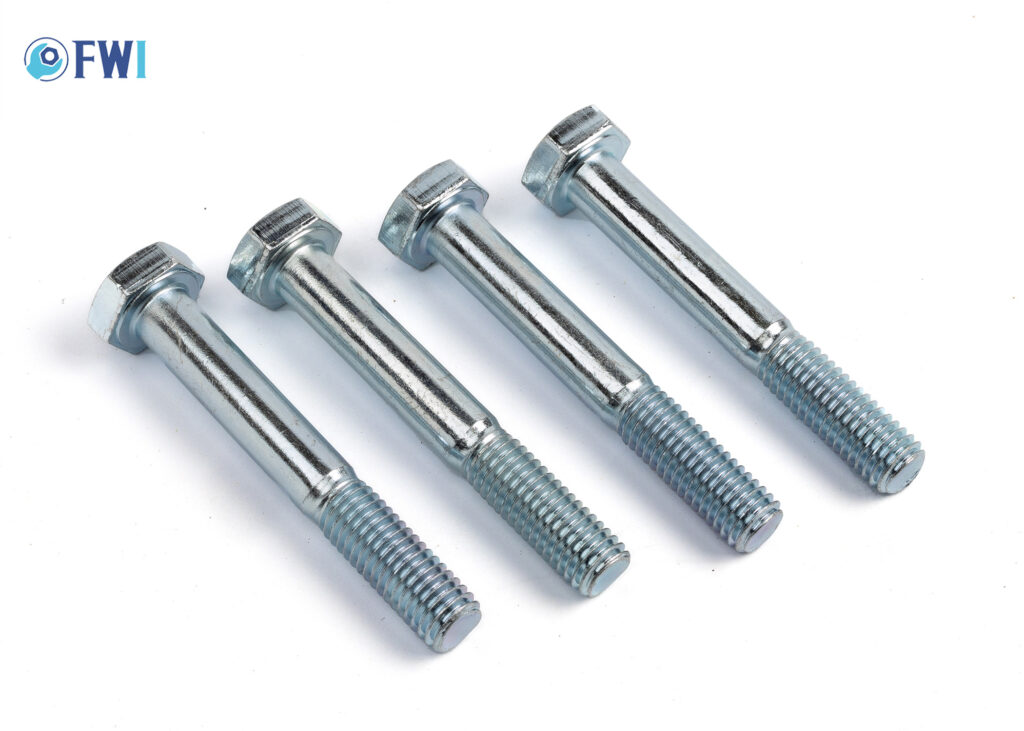Why Material Standards (ASTM, DIN, ISO) Are Crucial in Bolt Manufacturing

Strong 8k brings an ultra-HD IPTV experience to your living room and your pocket.
The manufacturing of bolts requires both precision and robustness as mandatory requirements. The vital function of bolts exists in keeping bridges and towers and machinery together with industrial equipment. The parts need to function exactly as designed, with no exceptions. The slightest deviation from perfect material or size specifications leads to severe structural damage.
Manufacturers rely on established material standards to stop such potential risks. The material standards originate from three global organizations, namely DIN (Deutsches Institut für Normung), ASTM (American Society for Testing and Materials), and ISO (International Organization for Standardization).
The standards provide specific guidelines which define material requirements and testing protocols, as well as size specifications and performance criteria. Each bolt operates securely and maintains precise fitment regardless of its installation location because of these standards.
This article describes why material standards hold such great importance while detailing their scope and demonstrating how they enable manufacturers to uphold high safety and quality measures.
Key Material Standards in Bolt Manufacturing
Let’s look at the main standards maintained by bolts fasteners suppliers in this industry.
DIN (Deutsches Institut für Normung)
These German standards are popular in Europe and other export-based industries.
● DIN 931 / 933: Hex bolts with full or partial threads
● DIN 7990: Heavy-duty hex bolts used in steel frames
● DIN 912: Socket head screws for tighter spaces
DIN standards focus on:
● Using metric units for size
● Thread types and precision
● Strength ratings like 8.8 or 10.9
● Head shapes and drive tools
ASTM (American Society for Testing and Materials)
ASTM standards are widely followed in North America and many international projects. They include:
● ASTM A307: General-purpose carbon steel bolts.
● ASTM A325 / A490: Strong bolts for use in construction work.
ASTM F593 / F594: Stainless steel bolts with clear rules for material and strength.
These ASTM standards define:
● Material contents like carbon or other elements
● Minimum and maximum strength levels
● How hard the bolts should be
● If coatings are needed
● Testing steps before approval
ISO (International Organization for Standardization)
ISO works to set uniform rules across countries. Their standards combine the best parts of national standards for international use.
● ISO 898-1: Covers strength rules for carbon and alloy steel bolts
● ISO 3506-1: Defines stainless steel fastener properties
● ISO 4014 / 4017: Describes hex bolts with full or partial threads
ISO standards are often required for global construction and industrial projects.
Importance Of Aligning With Material Standards For Industrial Bolt Manufacturer
Material standards are a shared set of rules among designers, makers, and users. Following these standards is essential for industrial bolt manufacturer.
1. Guaranteeing Mechanical and Structural Integrity
The different standards specify the required strength and hardness levels for bolts. Manufacturers ensure every bolt meets its intended load requirements by using these guidelines.
Bolts manufactured according to ISO 898-1 Grade 10.9 need to withstand powerful forces since they find applications in buildings and vehicles. The specified strength level serves as a safety threshold, which failure and potential danger would result if the bolts do not meet. The safety and strength of bolts depends on achieving the required standard.
2. Enabling Global Trade and Compatibility
The adoption of international standards enables bolts to operate smoothly across any global location. Products made to ISO or ASTM standards enable manufacturers to export their bolts worldwide without any requirement for redesign or modifications.
The wider reach becomes possible for bolt manufacturers. Manufacturers using standards can expand their sales beyond their local customer base. Standards-based bolts gain enhanced trust from buyers. Manufacturers who do not follow standards must pay increased costs while receiving less customer demand.
3. Enhancing Client Trust and Industry Reputation
The energy sector together with construction and vehicle industries need strict safety measures. The buyers in these industrial sectors demand verification that all bolts fulfill quality requirements.
Standard compliance demonstrates to customers that manufacturers prioritize product quality. Their commitment to quality standards enables them to develop enduring client partnerships and participate in extensive projects that need complete documentation certification.
4. Minimizing Legal and Regulatory Risks
Some industries are closely monitored by rules and laws. If bolts do not meet standards, companies may face fines, failed inspections, or lawsuits.
Many building codes only accept bolts that meet ASTM, ISO, or DIN. By always following these, manufacturers reduce risk. They can pass checks and avoid any penalties, protecting both the client and themselves.
5. Streamlining Production and Quality Control
Material standards help companies set clear processes. This includes using the right materials, applying heat treatment correctly, and testing every batch the same way.
By following a fixed method, they reduce errors, waste, and delays. It also improves in-house inspections, makes tracking easier, and helps during audits.
6. Facilitating Supply Chain Transparency and Traceability
Standards require accurate records. These include the metal used, the test results, and the final sizes.
With proper tracking, manufacturers can:
● Handle Recalls Quickly
● Pass Supplier Checks
● Claim Insurance When Needed
● Prove Quality During Reviews
All this gives buyers peace of mind. They know they are getting bolts that are well-documented and safe.
7. Supporting Innovation Without Compromising Safety
Even when companies create new bolt types or use special coatings, bolt suppliers in Delhi still adhere to set standards.
Standards also evolve over time to include new tech. This lets bolt makers stay creative without giving up on safety. They can launch new products that still fit into known systems and gain trust from engineers and buyers.
Benefits of Choosing Bolt Manufacturers in India That Comply with Material Standards
When companies buy bolts for large-scale work, picking bolts manufacturers in India who follow global standards (like ASTM, DIN, ISO, or BIS) gives many advantages. These benefits help buyers get strong, reliable bolts every time.
1. Assured Quality and Consistency Across Production Batches
Manufacturers that follow standards can keep bolt strength, size, and structure steady from one batch to the next. This reduces the chance of failure.
For buyers, this means bolts will hold up in tough situations like high heat, pressure, or movement. That level of trust is vital for industries like oil rigs, bridges, or car factories.
2. Enhanced Compatibility With Global Engineering Requirements
When projects involve international teams, the bolts used must match global codes. Indian bolt makers that follow ISO, DIN, or ASTM make bolts that fit everywhere.
Their bolts don’t need redesign or adjustment when used in Europe, America, or Asia. This makes planning easier and saves time and cost during projects.
3. Compliance With Regulatory and Safety Norms
High-risk industries like gas, shipping, and defense require parts to meet strict rules. Indian bolt suppliers who use material standards can give needed reports and testing papers.
These include documents like MTCs and compliance certificates. They help pass audits and avoid delays. It also shows that the bolts meet safety laws and project needs.
4. Access to Custom-Engineered Solutions Without Compromising Standards
Some projects need bolts in different sizes, shapes, or coatings. Indian manufacturers can meet these needs while still staying within global standards.
This helps sectors like renewable power or mining. They get exactly what they need without giving up quality, safety, or certification.
5. Lower Total Cost of Ownership (TCO) Over Time
Bolts made to standard may cost a bit more upfront, but they last longer and fail less. Indian suppliers who follow these standards use good raw materials and proven methods.
This reduces the need for repairs, cuts downtime, and avoids expensive damage. Over time, the total cost goes down, especially in high-use settings like power plants or rail systems.
6. Better Supply Chain Transparency and Documentation
Indian suppliers who follow standards keep strong records. They can provide:
● Metal Origin Certificates
● Test Data For Strength And Makeup
● Heat Treatment Records
● Size Inspection Reports
These help track bolts from start to finish. This is useful for checks, warranty claims, and solving any quality issues later.
7. Support for Sustainability and Ethical Sourcing Goals
Global standards often link to safety and eco-rules. Indian companies that follow them usually have cleaner methods, waste control, and proper handling of materials.
This supports companies with ESG targets. Buyers who want clean, fair supply chains prefer suppliers who meet these standards. It helps them stay compliant with their goals, too.
8. Ease in Securing Third-Party Certifications and Approvals
When bolts are made to known standards, getting other approvals like CE or ISO 9001 becomes simpler. Indian makers often work with outside testing labs to help buyers meet these rules.
This cuts down the time and cost of getting certified for international use. It also helps projects that require full traceability and approval from start to finish.
9. Stronger Export Potential for OEMs and Equipment Builders
If you're making products in India and want to sell abroad, using bolts that meet global standards makes exports smoother.
You avoid customs problems and technical issues. Also, when the parts are certified, buyers don’t raise many questions. This helps speed up deals and ensures your goods are accepted easily.
10. Alignment With 'Make in India' and Global Benchmarking
India is pushing for high-quality production under programs like ‘Make in India.’ Bolt makers who meet material standards lead this change.
By choosing them, buyers support local industry and get products that match global levels. This mix of cost and quality helps both local and global projects succeed.
Conclusion
ASTM, DIN, and ISO standards form the foundation of bolt manufacturing. They make sure bolts are strong, safe, and usable worldwide. These rules protect everything from trains to oil rigs.
When failure is not an option, following standards becomes a duty. For bolt makers, using these standards is not just smart—it is necessary. Whether for local use or global supply, the result is the same: bolts that deliver trust, quality, and long-term performance.
Note: IndiBlogHub features both user-submitted and editorial content. We do not verify third-party contributions. Read our Disclaimer and Privacy Policyfor details.


